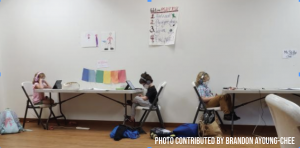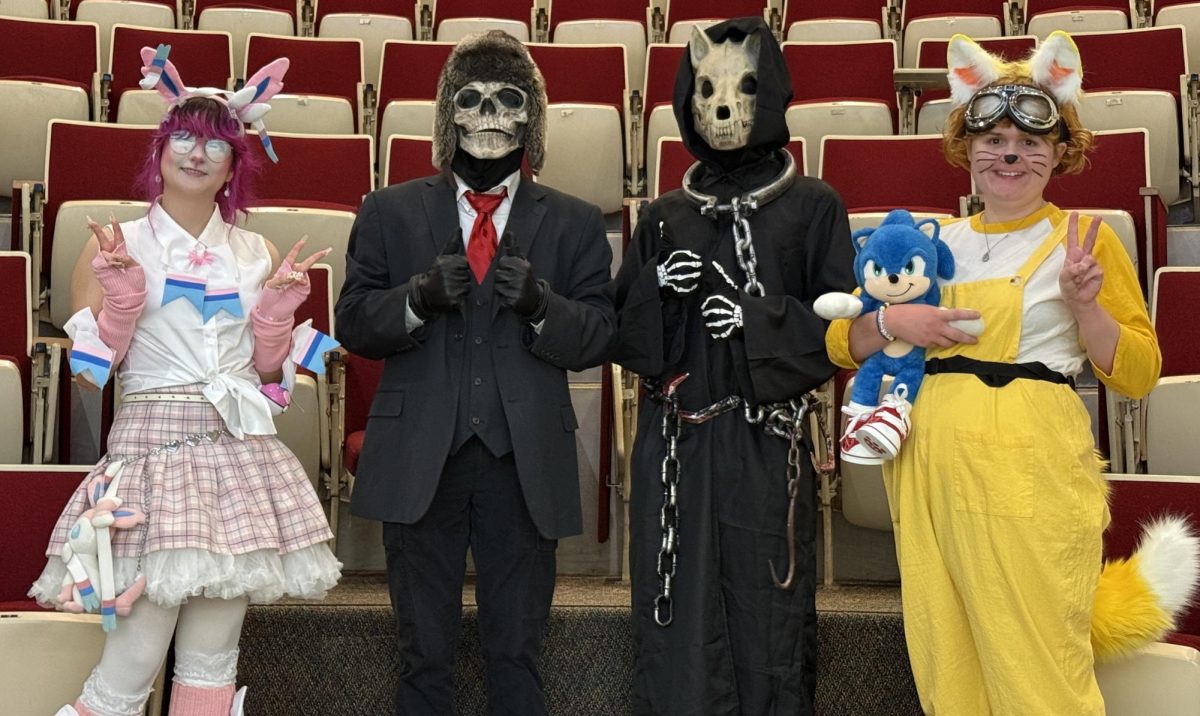Brandon Ayoung-Chee
News Writer

At 7:50 a.m. staff of the Jewish Community Center go through heat temperature tests at the entrance. Assigned into pairs, they flick the switch on dark rooms and sanitize them to spartan condition.
Sol Eure leads Dimyion, Timothy Stone and Cas Carter leads G’dila and Justin Greenbaum leads Yaterza. Class day in the JCC begins.
“Five minutes until we begin!” shouts Maraiah Schweiger, looking intently at her phone as the clock reaches 8 a.m.
Director of the youth and teen department in the Jewish Community Center, Mariah and co-director, Daniel Smeldley, run their Wednesday class day. A program in which the Community Center’s staff facilitates a new virtual classroom due to COVID-19.
“We exist because parents need somewhere for their children to stay while they work. This happens for our afterschool program,” Schweiger said. “But because of everything going virtual, we’re doing something we’ve never done before to help our community.”
Parents drop off their kids, putting them to the same temperature check process. Questions asking if they came into contact with COVID symptoms becomes routine.
“Did you leave the country? Did you become a government test subject for COVID since coming here?” Daniel jokes to the kids, giving levity to what has become standardized testing.
For 40 years, the JCC has been the home for Jewish life in Western North Carolina. Their mission is to connect the community of Jewish ties, and provide a safe spot or their children.
In response to the COVID-19 lockdown and schools going virtual, the board of directors initiated this Wednesday program for their community, as a way to gain support for their non-profit organization.
“It’s a rough time for everyone,” said Executive Director Ashley Lasher, helping out at the entrance. “We’re helping out those who need us, and we’re receiving help from them.”
Past the doors, children lug bags laden with school work and gear for daytime activities. The kindergartens carry the worst of it. The group leaders offer to help carry the bags, but as per usual with kids, they hold utmost confidence in their ability to do anything.
All of them, including the staff, wear masks. Excited faces on the kids, tired visages on the staff, they all wear the same thing.
The staff come to work at 2 p.m. usually for their afterschool program. Never had they thought it would be any earlier.
Tables and chairs within the three classrooms are organized to maintain social distance. Chairs are placed at opposite ends of the tables, as children face each other.
Once the tables were crowded with chairs, including children together, creating social incentive, but not anymore.
The children isolate from each other, to adhere to social distancing procedures.
Once oriented, the children bring out their laptops and ipads, put on their headphone jacks and plug in their chargers. This becomes their new classroom.
The group leaders jot down the various times at which the children hop on to classes.
“In 8:30, friends, everyone will head into their classrooms,” Sol annonces, in Dimyon, an affectionate call name for his kindergarten kids.
As 8:30 rolls around, kids enter their Zoom or Google Meet rooms, the class renders into complete silence. This being a reversal to what is commonly expected in a daycare center.
At 9-9:30 a.m. Timothy Stone orders Duck Donuts located on 182 Merrimon Ave via the Doordash app. A variety of sugar-coated doughnuts as a means to wake up staff, sluggish due to waking up at an early hour.
“Doughnuts in the break room if you want one,” Timothy texts into the JCC’s Voxer app, a substitute for walkie talkies. Taking turns, one by one, the
staff creep in the back rooms and stuff their mouths with doughnuts of all sugared varieties.
At G’dila, Timothy eats his doughnut and drinks his coffee, looking at the isolated environment with a skeptic mind.
“Things will change for these kids, and that’s something to be worried about,” Timothy gossiped to his co-workers. “When adults like us go to college, it’s whatever. But these kids don’t want to go to school. How can we expect them to stay focused on their computers?”
Timothy’s words prove true. At noon Bently, a kid in G’dila, insists that he does not have class.
“I have no class. It’s optional. I don’t have to go if I don’t want to,” he insists, creating a fuss.
Daniel tells him to hop on his computer. Bently throws a tantrum, but he eventually goes on. His teacher asks where he was yesterday, gaining further suspicion from the adults.
“That’s interesting,” Daniel said, overhearing.
Come 2 p.m. and classes are virtually over. The afterschool program begins, and the livelihood of children emerges, removing their headphones and running about.
Justin in Yatzera gets swarmed by children with noodles hitting him around every corner. Since touching is not allowed, this is their substitute.
“Because of my large frame, I have a natural tendency to get hit by kids,” Justin jokes.
At 3 p.m. it is snack time. The staff hand out muffins and cookies on paper sheets. “When I say the magic word, everyone puts off their
mask!” Sol shouts, then says the word: “Badabom!”
The kids remove their masks and eat. The one time it is only off in the building. A only time of respite from hot breath bouncing back into their faces.
At 4 p.m before the parents pick up their kids, pool time.
In orderly fashion and under procedure, the kids are safely escorted across the roads.
Sol of Dimyion stands at the road, between streets, with his hands outstretched.
“Safe to cross, friends,” he shouts.
One by one, they pass through them. Cars stop at the intersection as all the kids cross.
Even at the pool the kids socially distance. Still, the staff wear masks or face visors, the latter being preferable in waters.
“I only have my cloth mask, so I swim in the shallow end, always,” Justin says, monitoring the children in the water.
Dried off and brought back to the JCC at 5 p.m. , staff conduct a final check and clean up within their respective rooms.
It’s 6 p.m. and all parents picked up their kids. The staff arrange outside the building. Staff meeting begins.
“The board of directors are thinking about opening another full day like today. Any thoughts?” Marriah asks.
Tired faces around the circle mull over the idea, but it’s clear they don’t want to do it.
“I don’t think I could handle another Wednesday,” Justin says, breaking the silence.


















